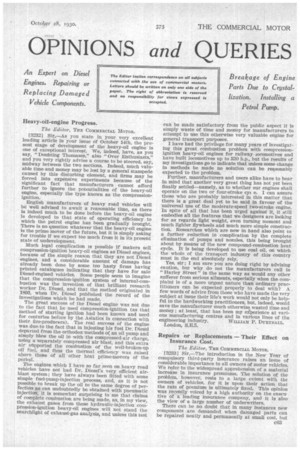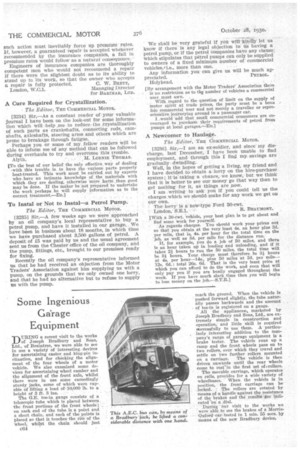OPINIONS and QUERIES
Page 121

Page 122

If you've noticed an error in this article please click here to report it so we can fix it.
Heavy-oil-engine Progress.
• The Editor, THE COMMERCIAL MOTOR.
[3232] Sir,—As you state in your very excellent leading article in your issue of October 14th, the present stage of development of the heavy-oil engine is one of exceptional interest. We, indeed, have, as you say, "Doubting Thomases," also "Over Enthusiasts," and you very rightly advise a course to be steered, say, midway between the two sections. Indeed, much valuable time and money may be lost by a general stampede caused by this disturbing element, and firms may be forced into expensive experiments because of the significant fact that manufacturers cannot afford further to ignore the potentialities of the heavy-oil engine, especially the type known as the compressionignition.
English manufacturers of heavy road vehicles will be well advised to await a reasonable time, as there is indeed much to be done before the heavy-oil engine is developed to that state of operating efficiency to which the petrol engine has been gradually brought. There is no question whatever that the heavy-oil engine is the prime mover of the future, but it is simply asking for trouble if we expect too much from it in its present state of undevelopment.
Much legal complication is possible if makers sell compression-ignition heavy-oil engines as Diesel engines, because of the simple reason that they are not Diesel engines, and a considerable amount of damage has already been done by some too hasty firms having printed catalogues indicating that they have for sale Diesel-engined vehicles. Some people seem to imagine that the compression-ignition system of internal-combustion was the invention of that brilliant research worker Dr. Diesel, and that the method originated in 1893, when Dr. Diesel published the record of the investigations which he had made.
The great success of the Diesel engine was not due to the fact that he used compression-ignition (as that method of starting ignition had been known and used for centuries before by the Asiatics in connection with their fire-producers). The real success of the engine was due-to the fact that in injeoting his fuel Dr. Diesel departed from the orthodox methods of an oil pump and simply blew the oil in with the compressed-air charge, using a separately compressed air blast, and this extra air stipported the combustion of the well-broken-up oil fuel, and thus the thermal efficiency was raised above those of all other heat prime-movers of the perio.d.
The engines which I have so far seen on heavy road vehicles have not had Dr. Diesel's very efficient airblast system ; they have always been fitted with some simple fuel-pump-injection process, and, as it is not possible to break up the oil to the same degree of perfection as can undoubtedly be obtained with pneumatic Injection; it is somewhat surprising to me that claims of complete combustion are being made, as, in my view, the exhaust gases from these hydraulic-injection compression-ignition heavy-oil engines will not stand the searchlight of exhaust-gas analysis, and unless this test can be made satisfactory from the public aspect it is simply waste of time and money for manufacturers to attempt to use this otherwise very valuable engine for general transport purposes. I have had the privilege for many years of investigating this great combustion problem with compressionignition heavy-oil engines for railway locomotives and have built locomotives up to 320 h.p., but the results of my investigations go to indicate that unless some change in methods be mecle no solution can be reasonably expected to the problem. Further, manufacturers and users alike have to bear in mind that another very great thing has not yet been finally settled—namely, as to whether our engines shall operate on the two or four-stroke eye e. I can assure those who are probably interested in this matter that there is a great deal yet to be said in favour of the universal use of the moderate-speed two-stroke engine. In spite of all that has been urged against it, it still embodies all the features that we designers are looking for as regards light weight, even turning moment and much lighter flywheels and much more simple construction. Researches which are now in hand also point to a further reduction in complication by the complete elimination of pumps and nozzles, this being brought about by means of the new compound-combustion heat cycle. It is being developed to use coal oil, on which the whole of the transport industry of this country must in the end absolutely rely.
Yes, sir ; I am sure you are doing right by advising caution, but why do not the manufacturers call in "Harley Street" in the same way as would any other sufferer from serious ailments, especially when the complaint is of a more urgent nature than ordinary practitioners can be expected properly to deal with? A. few words of advice from those who have made the very subject at issue their life's work would not only be helpful to the hardworking practitioners, but, indeed, would save the manufacturer much otherwise wasted time and money ; at least, that has been my dperience at various manufacturing centres and in various lines of the
engineering industry. WILLIAM P. DIIRTNALL. London, S.E.5.
Repairs or Replacements — Their Effect on Insurance Cost.
The Editor, THE COMMERCIAL MOTOR. [32331 Sir,—The introduction in the New Year of compulsory third-party insurance raises an issue of considerable importance to all owners of motor vehicles. We refer to the widespread apprehension of a material increase in insurance premiums. The solution of the problem, however, rests to a large extent with the owners of vehicles, for it is upon their action. that the rate of premium is ultimately fixed. This opinion was recently voiced by a high authority on the executive of a leading insurance company, and it is also the view of a large number of underwriters.
There can be no doubt that in many instances new components are demanded when damaged parts can be repaired neatly and permanently at small cost, but c63 such action must inevitably force up premium rates. If, however, a guaranteed repair is accepted whenever recommended by the insurance companies, a fall in premium rates would follow as a natural consequence.
Engineers of insurance companies are thoroughly competent men who would not recommend a repair if there were the slightest doubt as to its ability to stand up to -its work, so that the owner who accepts
a repair is fully protected. C. W. BRETT, London, W.C.1. Managing Director for BARIMAR, LTD.
A Cure Required for Crystallization. "
• The Editor, THE COMMERCIAL MOTOR.
[3234] Sir,—As a constant reader of your valuable journal I have been on the look-out for some information which will help ,me to reducethe .crystallization of such parts as crankshafts, connecting rods, camshafts, axleshaftS, steering arms and others which are prone to breakage through fatigue.
Perhaps you or some of my fellow readers will be able to inform me of any method that can be followed during overhauls to try and overcome this trouble.
Alyth. M. LORNIE THOMAS.
[To the best of our belief the only effective way of dealing -with this trouble is to have ,tile various parts properly heat-treated. This work mustbe carried out by experts who. have an intimate knowledge of the materials with which they are dealing, otherwise more harm' than good may be done. If the maker be not prepared to undertake the work perhaps he will supply information as to the correct treatment.—En.]
To Instal or Not to Instal—a Petrol Pump.
The Editor, THE COMMERCIAL MOTOR.
[3235] Sir,—A few weeks ago we were approached by an oil company's local representative to buy a petrol pump, and have it installed in our garage. We have been in business about 18 months, in which time we have purchased about 3,500 gallons of petrol. A deposit of 15 was paid by us and the usual agreement sent us from the Chester office of the oil company, and the pump, fittings, etc., brought to our premises ready for fixing.
Recently the oil company's representative informed us that he had received an objection from the Motor Traders' Association against him supplying us with a pump, on the grounds that we only awned one lorry, and that he had no alternative but to refuse to supply us with the pump. We shall be very grateful if you will kindly lot us know if there is any legal objection to us having a petrol pump, or if the petrol companies have any clause Which stipulates that petrol pumps can only be supplied to owners of a fixed minimum number of commercial vehicles,si.e., more than one.
Any information you can give us will be much ap preciated. PETROL. . Holyhead.
[By arrangement with the Motor Traders' Association there is no restriction as to 012 number of vehicles a commercial user, must own. ,
With regard to the question of limit on the supply of motor spirit at trade prices, the party must be a bona fide commercial user and not merely a traveller or reprosensative journeying around in a passenger ear.
,would add that small commercial consumers are encouraged to purchase their requirements of petrol from pumps at local garages.ED.]
A Newcomer to Haulage.
The Editor, THE COMMERCIAL MOTOR.
[3236] Sir,—I am an ex-soldier, and since my discharge, last December, I have been unable to find employment, and through this I find my savings are gradually . dwindling.
Well, in the hopes of getting a living, my friend and I have decided to obtain a lorry on the hire-purchase system; it-is taking a chance; we know,but we think that it. is better to see our money go that way than to get nothing for it, as things are now.
I am -writing to ask you if you could tell us the charges _which we should make for any work we get on our own. •
The lorryis a neW-type Ford 30-cwt.
• London,S.E.1. R. BEAUMONT.
[With a 30-Cwt. vehicle, your best plan is to get about and ' &id some work for yourself.
As regards charges. You should work your prices out so that you obtain at the very least 4s. an hour plus 3d. per mile, that is, 4s. per hour for the total time on the -job, as well as 3d. per mile for the distance run.
If, for example, you do a job of 50 miles, and there is an hour taken up in loading and unloading, and if it takes 21 hours to run the 50 miles, the total time will be 34. hours. Your, charge must therefore be 3i hours at 4s. per hour-14s„ plus 50 miles at 3d. per mile-12s. 6d.: total 26s. 6d. That is the very least price at which you can afford to do the work, and even that will only pay you if you are busily engaged throughout the -week. If you have much slack time then you will begin to lose money on the job.—S.T.R.]




















































































































































































